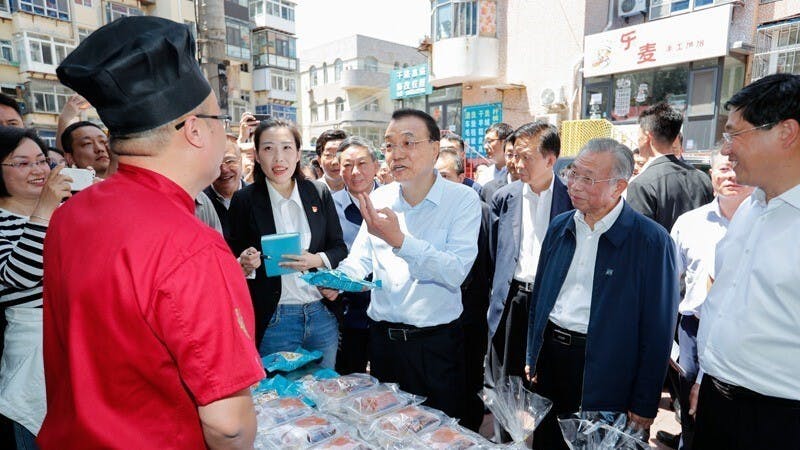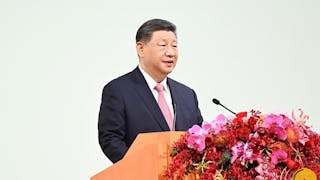中國國務院前總理李克強於10月27日上午突然去世,他對中國未來幾年的發展留下重要遺產,這主要歸功於他的務實精神,部分原因在於他溫和的政治態度,使他在長達十年擔任用國務院總理期間,能夠與其他中國高層領導人和諧共處。
李克強,1955年7月1日出生於安徽省,1976年加入中國共產黨。1982年任共青團中央常委、共青團中央書記處書記。北京大學團委書記。1993年,他政治生涯步步高升,成為第8屆全國人大常委會委員,同時被選為中國青年政治學院院長、共青團中央書記處第一書記──一位冉冉上升的政治明星,預示着未來美好的仕途。1997年,李克強當選中共第15屆中央委員。一年後,任河南省代省長、中共河南省委副書記。2002年,李克強升任河南省委書記、省長。 兩年後,他被派往遼寧省任黨委書記。2007年至2022年擔任中共中央政治局常委。2008年至2013年,李克強升任國務院副總理。2013年至2023年,他擔任國務院總理,直至2023年3月卸任。
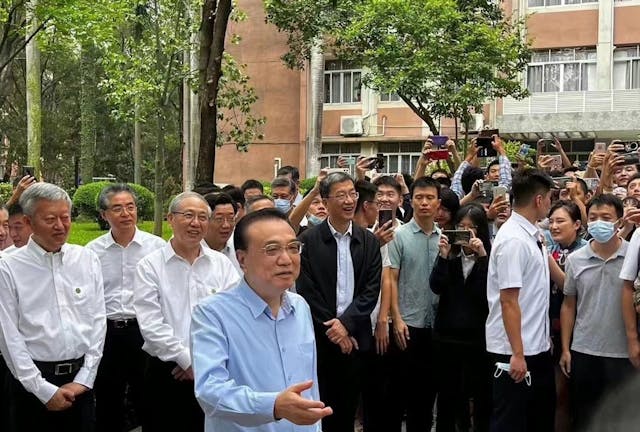
李克強對中國最大的貢獻
李克強對中國最大的貢獻,就是在他執政期間保持了高水平的經濟增長和較高的就業率,尤其是在2020年初至2023年初的困難時期抵禦新冠病毒的侵襲的能力。他的年度《政府工作報告》可謂面面俱到,涵蓋了經濟發展策略、可持續發展、脫貧、公共衛生、農業發展、食品安全、創造就業、教育改革、住房供應、養老、內部消費、對外貿易關係、工業發展、支持中小企業、資訊和技術,以及政府對中國社會經濟發展的必要干預。
最令人印象深刻的是,他在2020年初至2023年初的困難時期,他擔任了中央應對疫情工作領導小組組長,派遣副總理劉延東應對在武漢和其他城市爆發的新冠疫情。總體而言,李克強領導下的國務院,在其管轄範圍內展現了幹練有效的管理能力,幫助中國在過去10年中保持了快速成長和社會經濟穩定發展。
李克強對中國經濟巧妙的宏觀調控和及時的干預,是他在2013年至2023年初擔任國務院總理的標記。他強調透過重組各部會精簡政府架構的重要性,堅持廉政、以及落實一帶一路倡議。李克強並不是一位高調宣揚自己成就的國務院總理。然而,他可以說是一位十分務實的國務院總理,他非常重視政策的實施和成果。從這方面來看,李克強可說是過去10年來最務實而低調的國務院總理。他是一位能力強、實事求是、廉潔又低調的國務院總理。他總是坦誠、開放地回答傳媒提問。
李克強的務實態度,可以從他2023年3月卸任前在北京最後一次記者會中看出。他承認新冠疫情為中國政府帶來了巨大的挑戰,「我們志不求易、事不避難、行不避險,盡了最大努力。」李克強補充說:「行大道、民為本、利天下,就是要以民之所望為施政所向。」 最後,他說:「政府工作有人民認可的地方,也有與他們的期盼有差距和不足的地方,這些我們是清楚的。」
強調做事適度 不誇大領導成就
顯然,李克強務實主義的特點就是強調做事要適當適度,把政策執行在公眾都能接受的方向上,在與民眾的期望差距中認識到政府的弱點──以務實、溫和、謙虛的態度處理中國的管治問題,不同於官方傳媒和宣傳,後者經常慣性誇大政府領導層的成就。
正是因為李克強的務實主義,中國在新冠疫情期間採取了雙循環政策,提振國內消費是政府的重點。透過提振國內消費,中國便能夠應對疫情期間進出口貿易下降的困難。同時,中國加入《區域全面經濟夥伴關係協定》(RCEP)也促進了對外關係,這是李克強的另一個重要貢獻,儘管過去10年中國的外交政策呈現出國家主席和國務院總理雙重領導的格局。
疫情期間,企業經營困難,李克強以務實的態度,在各城市倡議支持「地攤經濟」。 儘管官方傳媒和宣傳部門後來批評了地攤的出現,但可見李克強的務實精神。他支持地攤的開放態度,可與最近特區政府刺激夜市以重振香港經濟的務實嘗試比較。幾乎每周末都有數萬人湧上深圳。即使疫情過去,香港本地的商家也深受影響。
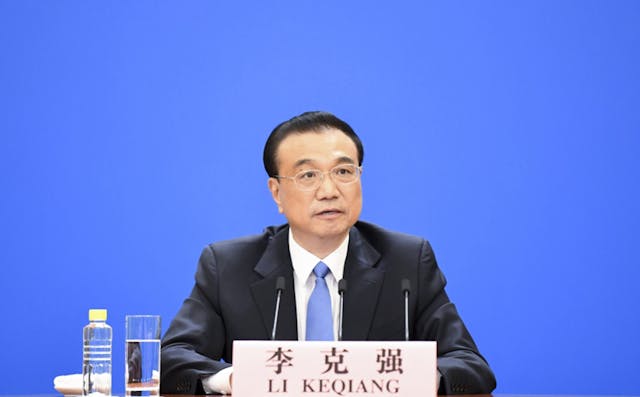
李克強指數 反映務實一面
李克強擁有經濟學博士學位,他在河南、遼寧的經濟成就使他升任國務院總理。在遼寧,他向傳媒介紹了2007年衡量該省經濟發展的3個主要指標:銀行貸款發放量、鐵路貨運量和工業用電量。這3個指標明顯是遼寧省如何實現高成長、提振當地就業和營商環境的關鍵績效指標。
不同於官方傳媒和宣傳慣性傾向於描繪美好圖景而不是負面報道,李克強的公開講話很務實。他說,2020年,中國有6億人每個月收入只有1000元。這些言論反映了李克強的務實作風,而官方傳媒和宣傳對於中國真實情況的描述,往往更着重意識形態先行。
在社會正義的問題上,李克強表明了他是一個堅定的社會主義者,對拐賣兒童案件表達了憤怒,表明了他實現經濟社會相對平衡發展的決心,特別是在《政府工作報告》中每年強調的扶貧方面。 他也理解在中國實現高增長的困難,在2020年表示,經濟體量愈大,就像高山愈高,要達成的百分比也愈不容易。
習李關係被外媒過度誇大矛盾
過去10年,共青團培養的黨員幹部在晉升中共最高領導層的過程中並沒有受到特別青睞,例如前國家主席胡錦濤的親信、前副總理胡春華。李克強的繼任者不是胡春華,而是2004年擔任浙江省委書記習近平的前秘書李強。李克強對在2023年3月的繼任他的人採取寬鬆的態度,讓習近平主席作出適當的決定。與外媒過度誇大李克強與習近平近10年來的所謂矛盾不同,李克強的官方講話,特別是他擔任國務院總理期間向全國人大提交的《政府工作報告》,經常強調「以習近平同志為核心的黨中央領導」這個基本特徵卻一直被外國和香港傳媒忽視。
李克強對香港、澳門的發展始終採取務實態度。香港在2019年的社會動盪中受到損害後,李克強在2019年12月向時任特首林鄭月娥表示,香港必須走出困境。李克強沒有將2019年下半年香港政治鬥爭歸咎於任何一方,而是強調尋求解決方案──這是他務實主義的另一個標誌。 同樣,李克強並沒有批評澳門對賭場資本主義的依賴,而是強調了維護和實現澳門社會穩定和經濟繁榮的重要性。
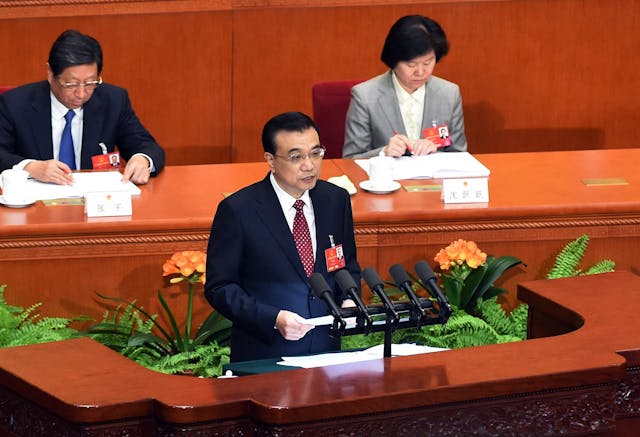
處理中國發展 不講究意識形態
從馬克思主義角度看,李克強始終是一個堅定的馬克思列寧主義者,是實現社會公平正義、走真正中國經濟現代化道路的馬克思主義者,是強調中國共產黨領導中國發展的列寧主義者。李克強還是一位實證主義者,以正面的態度看待事物。不幸的是,他因突發心臟病去世了。李克強也可以被視為高度鄧小平主義,類似於鄧小平的實用主義,即「不管黑貓白貓,能抓到耗子的就是好貓」──這是一種不那麼講究意識形態處理中國發展的方法。李克強也高度重視中國經濟生產力的加速發展(借用馬克思的術語),將經濟成長視為推動功的增關鍵。同時,李克強是一位非常溫和、理性、坦率的實用主義者,他公開承認中國的治理差距。
總而言之,李克強作為一個受過高等教育的經濟學家、一個非常有能力的國務院總理、一個真正務實的馬列鄧主義者、一個低調勤勉的中共領導人和總理,他的遺產將被中華人民共和國歷史所銘記。 他的政治溫和、和諧共處,以及與其他中共高層領導人的成功合作,被許多外部觀察家所忽視。在過去的10年裏,李克強的務實主義、意識形態色彩較少,成為他的政治標誌。正是因為他的巨大功績,據報道,10月27日上午,不少上海市民在他的遺體從醫院運回上海機場的路上獻上花圈,以表達他們的哀思。雖然官方將如何處理李克強的喪禮仍有待觀察,但可以預見的是,許多中國人民一定會記得他是一位令人尊敬、成功、有能力、務實的總理,他們將永遠懷念他。
Li Keqiang’s pragmatism and his legacy
The sudden passing away of the late Chinese Premier Li Keqiang on the morning of October 27 has important legacies for China’s development in the coming years mainly due to his pragmatism and partly because of his political moderation that has made him coexist with other top Chinese leaders harmoniously for ten years during his premiership.
Born on July 1, 1955 in the province of Anhui, Li Keqiang joined the Communist Party of China (CPC) in 1976. In 1982 he became a member of the Central Committee of the Communist Youth League (CYL) and also a party secretary of the CYL at Peking University. In 1993, he rose up the political ladder and became a member of the Standing Committee of the Eighth National People’s Congress, while simultaneously he was chosen as the Dean of the Chinese Youth Political Academy and the first secretary of the CYL Central Secretariat – a rising political star pointing to a rosy career in the future. In 1997, Li became a Fifteenth Central Committee member of the CPC. One year later, he became an acting governor of the Henan province and a deputy party-secretary of the CPC in Henan province. In 2002, Li was promoted to be the Henan province party-secretary and governor. Two years later, he was sent to Liaoning province to be the party-secretary. From 2007 to 2022, Li became a member of the Standing Committee of the Politburo of the CPC. From 2008 to 2013, Li was promoted as the State Council as Deputy Premier. Between 2013 and 2023 he became the Premier until March 2023 when he stepped down.
Li Keqiang’s greatest contribution to China during his premiership years was the maintenance of a high degree of growth, a relatively high level of employment, and most importantly the ability to resist the encroachment of Covid-19 during the difficult years from early 2020 to early 2023. His annual government report could be described as comprehensive in all policy areas, covering the strategies of economic development, sustainability, anti-poverty, public health, agricultural development, food safety, jobs creation, education reform, housing supply, elderly care, internal consumption, external trade relations, industrial development, the support of small and medium enterprises, information and technology, and the necessary government intervention in China’s socio-economic development.
Most impressively, he headed the small group dealing with Covid-19 in the difficult years from early 2020 to early 2023, dispatching deputy premier Liu Yandong to tackle the eruption of Covid-19 in Wuhan and later other cities. Overall, the State Department under Li’s leadership demonstrated competent and effective administration over its jurisdictional areas, helping China maintain rapid growth and stable socio-economic development in the past decade.
Li Keqiang’s macro-level regulation and skillful as well as timely intervention in the economy of China were his hallmarks of premiership from 2013 to early 2023, emphasizing the importance of streamlining the government bureaucracy through his reorganization of various ministries, the insistence in clean governance, and the implementation of the Belt and Road initiatives. Li was not a premier who adopted a very high-profile approach to emphasizing his successes. However, he could be seen as a very pragmatic premier attaching immense importance to policy implementation and achievements. In this aspect, Li stood out as perhaps the most pragmatic and yet low-key premier in the past decade. He stood out as a highly competent, pragmatic, clean and yet low-profile premier who answered questions from the media frankly and openly.
Li’s pragmatism could be seen in his remarks to the media in March 2023 before he stepped down in Beijing. He admitted that Covid-19 brought about tremendous challenges to the Chinese government, and that “We do things not from the perspective of doing so easily. We do things without avoiding difficulties and we implement policies without avoiding dangers. We try our very best.” Li added: “We walk in large paths, we treat citizens as the basis, we do things beneficial to the tianxia (society). Our policy directions are made for the expectations of the people.” Finally, he said that if there were gaps between what the government did and what the public expected, his government was aware of them.
Clearly, Li Keqiang’s pragmatism was characterized by his emphasis on doing things in a moderate and appropriate way, implementing policies in a direction acceptable to the public, and understanding the weaknesses of the government in any expectation gap with citizens – a practical, moderate and humble approach to dealing with governance in China, unlike the state media and propaganda which naturally exaggerates the government leadership’s achievements from time to time.
Exactly because of his pragmatism, China adopted the policy of dual circulation in the Covid-19 period during which domestic consumption was the emphasis of the government. Through the boosting of domestic consumption, China could deal with the difficulties in the decline in exports and imports during the Covid years. At the same time, the external relations of China were stimulated by its entry into the Regional Comprehensive Economic Partnership – another important contribution of Li Keqiang although Chinese foreign policy in the past decade showed a pattern of dual leadership under the directions of both the president and the premier.
During the Covid years, when businesses went down, Li Keqiang adopted a pragmatic approach to advocating and supporting the street stalls in various cities. Although the state media and propaganda later criticized the emergence of street stalls, Li’s pragmatism could be seen. His open-minded approach to supporting street stalls was comparable to the recent Hong Kong government’s practical attempt at stimulating night markets to revive the local economy of Hong Kong where almost tens of thousands of people flocked to Shenzhen during weekends and where the local businesses have been deeply affected even after the Covid-19 era.
Holding a PhD in economics, Li Keqiang’s economic achievements in Henan and Liaoning led to his promotion to be the premier. In Liaoning, he told foreign media three main indicators in the province’s economic development in 2007: banks loans in the long term, railroad investment, and industrial electricity usage. These three indicators were clearly the key performance indices of how to achieve high growth rates in Liaoning province, boosting local employment and business environment.
Unlike the official state media and propaganda which naturally tend to paint a rosy picture rather than reporting on negative aspects, Li Keqiang was down-to-earth in his public remarks. In 2020, he said that there were 600 million people who belonged to the middle and lower ranked salaried citizens each receiving a monthly income of 1,000 yuan only. Such remarks were reflective of the pragmatic characteristic of Li, while the state media and propaganda tended to be far more ideological in their official portrayal of China’s real situation.
On social justice issues, Li Keqiang showed that he is a resolute socialist expressing his anger at child abduction cases and showing his determination of achieving relatively balanced development in the economy and society, especially in the aspect of poverty alleviation as emphasized annually in his government report. He also understood the difficulties of China in achieving high growth rate, saying in 2020 that the larger the economic entity is, the more difficulties it encounters to achieve high growth rate, like a person climbing up a mountain at the top.
In the past decade, party cadres groomed by the CYL were not particularly favored in the process of promotion to the top leadership of the CPC, like former premier Hu Chunhua, a protégé of the former President Hu Jintao. Li Keqiang’s successor was not Hu Chunhua, but Li Qiang who was a former secretary serving Zhejiang’s party secretary Xi Jinping in the year 2004. Li Keqiang adopted a relaxed attitude toward who would succeed him in March 2023, letting President Xi Jinping make the proper decision. Unlike the foreign media which tended to overstate the so-called contradictions between Le Keqiang and Xi Jinping in the past decade, Li’s official remarks, especially his annual report delivered to the National People’s Congress during his premiership, often emphasized “the CPC under the core leadership of comrade Xi Jinping” – an essential feature that was constantly neglected by the foreign and Hong Kong media.
Li Keqiang adopted a consistently pragmatic attitude toward the development of Hong Kong and Macau. After Hong Kong was undermined by the 2019 turbulence, he told the former Chief Executive Carrie Lam in December 2019 that Hong Kong would have to get out of its difficulties. Without putting any blame on any side of the political struggles in Hong Kong during the latter half of 2019, Li Keqiang emphasized the quest for solutions – another hallmark of his pragmatism. Similarly, Li did not criticize Macau’s reliance on casino capitalism, but instead he stressed the importance of maintaining and achieving social stability and economic prosperity of Macau.
From a Marxist perspective, Li Keqiang remained a dedicated Marxist-Leninist, Marxist in the sense of achieving social equity and justice and adopting a really Chinese path of economic modernization, and Leninist in the sense that he emphasized the leadership of the CPC in China’s development. Li was also a positivist who looked at things and matters in a positive manner. Sadly, he passed away due to sudden heart attack. Li Keqiang could also be regarded as highly Dengist, similar to Deng Xiaoping’s pragmatism that a cat is a good one no matter whether its color is white or black – a far less ideological approach to dealing with China’s development. Le Keqiang also attached high importance in the acceleration of economic productive forces, to borrow Marx’s term, in China, seeing economic growth as the key to drive successes. At the same time, Li was a very moderate, reasonable, and frank pragmatist who openly admitted China’s governance gaps.
In conclusion, Li Keqiang’s legacy as a highly educated economist, a highly competent premier, a really pragmatic Marxist-Leninist-Dengist, and a low-profile and diligent CPC leader and premier will be remembered in the history of the People’s Republic of China. His political moderation and harmonious coexistence and successful collaboration with other top CPC leaders have been neglected by many outside observers. Li’s pragmatism with less ideological overtone stood out as his political hallmark in the past decade. Exactly because of his tremendous achievements, it was reported that many citizens in Shanghai outpoured their sentiments by putting wreaths of flowers on the roads where his body was transferred back from the hospital to the Shanghai airport on the morning of October 27. It remains to be seen how the official mourning will be managed, but it can be anticipated that many citizens of China will surely remember him as a highly respectable, successful, competent and pragmatic premier whom they love forever.
原刊於澳門新聞通訊社(MNA)網站,本社獲作者授權轉載。原文網址:https://www.macaubusiness.com/opinion-li-keqiangs-pragmatism-and-his-legacy/



